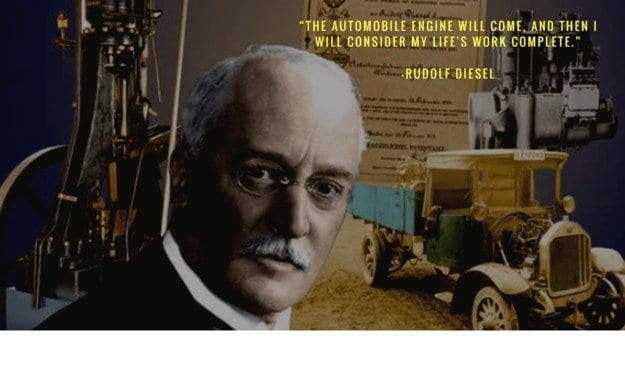
In memory of Rudolf Diesel: 160 years since the birth of a genius

A story about the deep nature of the dreamer and the creator of the diesel engine
The ingenious designer Rudolf Diesel has created one of the greatest creations in industrial history. However, his torn soul is tormented by the meaning of everything he has created.
On Valentine's Day, February 14, 1898, the son of a Swede, Emanuel Nobel, arrived at the Bristol Hotel in Berlin. After the death of his father, Ludwig Nobel, he inherited his oil company, by far the largest in Russia at the time. Emanuel is tense and anxious because the deal he is about to make is of strategic importance to him. After his uncle Alfred decided to donate his gigantic inheritance, which included a huge explosives company and a large share in the same oil company of the Nobel Foundation he created, the latter began to experience serious financial difficulties, and he looked for all kinds of solutions. For this reason, he decided to get acquainted with a man already known at that time by the name of Rudolf Diesel. Nobel wants to buy from him the patent rights to produce in Russia a recently created German economical internal combustion engine of German origin. Emanuel Nobel has prepared 800 gold marks for this purpose, but still thinks he can negotiate a price cut.
The day is very busy for Diesel - he will have breakfast with Friedrich Alfred Krupp, then he will have a meeting with the Swedish banker Markus Wallenberg, and in the afternoon he will be dedicated to Emanuel Nobel. The very next day, the banker and the enterprising inventor signed an agreement that led to the creation of a new Swedish diesel engine company. However, negotiations with Nobel are much more difficult, despite Diesel's claim that the Swede is "more passionate about his engine" than he is. Emanuel's uncertainty is not related to the future of the engine - as a technocrat he does not doubt it, but as a businessman he believes that the diesel engine will increase the overall consumption of petroleum products. The same oil products that Nobel's companies produce. He just wants to work out the details.
However, Rudolph did not want to wait and unceremoniously told Nobel that if the Swede did not accept his terms, Diesel would sell his patent to his rival John Rockefeller. What allows this ambitious engineer turned businessman to blackmail the Nobel Prize so successfully and confidently stand in the way of the two most influential people on the planet? None of his engines can run reliably yet, and he recently signed a contract with beer maker Adolphus Busch for exclusive production rights in the United States. However, his blackmail gave results, and the deal with Nobel was made.
15 years later ...
September 29, 1913. An ordinary autumn day. A thick fog covered the mouth of the Scheldt River in the Netherlands, and the steam engines of the Dresden ship crashed through the holds, carrying it across the English Channel to England. On board is the same Rudolf Diesel, who had sent his wife an optimistic telegram shortly before that the upcoming trip would be successful. It seems to be so. At about ten o'clock in the evening, he and his co-workers, George Carels and Alfred Luckmann, decided it was time to go to bed, shook hands and wandered through their cabins. In the morning, no one can find Mr. Diesel, and when his worried employees search for him in the cabin, the bed in his room is intact. Later, the passenger, who turned out to be a cousin of Indian President Jawaharlal Nehru, will remember how the man's steps were directed towards the ship's rail. Only the Almighty knows exactly what happened next. The fact is that on the page of September 29 in the diary of Rudolf Diesel, a small cross is carefully written in pencil ...
Eleven days later, Dutch sailors found the body of a drowning man. Because of its intimidating appearance, the captain passes it on for the good of the sea, preserving what he finds in it. A few days later, one of Rudolf's sons, Eugen Diesel, recognized them as belonging to his father.
In the deep darkness of the fog ends the promising career of the creator of a brilliant creation, named after him "diesel engine". However, if we look deeper into the nature of the artist, we find that the soul is torn by contradictions and doubts, which give good reason to recognize as authoritative not only the thesis that he may have been the victim of German agents seeking to prevent the sale of patents to the British Empire. on the eve of the apparently inevitable war, but this Diesel committed suicide. Deep torment is an integral part of the inner world of a brilliant designer.
Ingenious creation of genius
Rudolph was born on March 18, 1858 in the French capital Paris. The rise of chauvinistic sentiments in France during the Franco-Prussian War forced his family to emigrate to England. However, their funds are extremely insufficient, and his father is forced to send young Rudolf to his wife's brother, who is not a random person. Diesel's uncle was then the renowned Professor Barnickel, and with his support he succeeded in the Industrial School (then the Technical School, now the University of Applied Sciences) in Augsburg and then at the Technical University of Munich, receiving an honors degree. ever succeeded. The efficiency of the young talent is phenomenal, and the persistence with which he strives to achieve his goals simply amazes those around him. Diesel dreams of creating the perfect heat engine, but ironically it ends up in a refrigeration plant. In 1881, he returned to Paris at the invitation of his former mentor, Professor Karl von Linde, the inventor of the ice maker named after him, and laid the foundations for today's giant Linde cooling system. There Rudolph was appointed director of the plant. At that time, gasoline engines were just starting, and in the meantime, another heat engine was created. It is a steam turbine, recently invented by the French Swede De Leval and the Englishman Parsons, and is vastly superior to the steam engine in efficiency.
In parallel with the development of Daimler and Benz and other scientists, they are trying to build engines that run on kerosene. At that time, they did not yet know well the chemical nature of the fuel and its tendency to detonation (explosive ignition under certain conditions). Diesel closely monitors these events and receives information about these events and after many analyzes realizes that all projects lack something fundamental. He came up with a new idea that was radically different from the underlying Otto-based engines.
“The air in my engine will become much thicker, and then fuel injection will start at the last minute,” says the German engineer. "Elevated temperatures will cause the fuel to self-ignite, and a high compression ratio will make it much more fuel efficient." A year after receiving a patent for his idea, Diesel published a brochure with a rather loud and defiant title "Theory and construction of a rational heat engine, which should replace the steam engine and the now known internal combustion engines."
Dream theory
Rudolf Diesel's projects are based on the theoretical foundations of thermodynamics. However, theory is one thing and practice is quite another. Diesel has no idea what will be the behavior of the fuel that it will inject into the cylinders of its engines. To begin with, he decided to try kerosene, which was so widely used at that time. However, the latter is obviously not a solution to the problem - on the first try, an experimental engine manufactured at the Augsburg machine plant (now known as the MAN heavy truck plant) was torn apart, and one pressure gauge almost killed the inventor by flying centimeters. from his head. After many failed attempts, Diesel still managed to get the experimental machine running, but only after making some design changes and only when he switched to using a heavier oil fraction, later named "diesel fuel" after him.
Many entrepreneurs are beginning to take an interest in Diesel's developments, and his projects are about to revolutionize the world of heat engines, because his engine actually turns out to be much more economical.
The proof of this was presented in the same 1898 in which our history began, in Munich, where the Machinery Exhibition was opened, which became the cornerstone of the further success of Diesel and its engines. There are engines from Augsburg, as well as a 20 hp engine. plant Otto-Deutz, which drives the machine to liquefy the air. Especially great is the interest in the motorcycle produced at the Krupp factories - it has 35 hp. and rotates the hydraulic pump shaft, creating a jet of water 40 m high. This engine works on the principle of a diesel engine, and after the exhibition, German and foreign companies buy licenses for it, including Nobel, which receives the rights to manufacture the engine in Russia. .
As absurd as it may seem, at first the diesel engine met the greatest resistance in its homeland. The reasons for this are quite complex, but are related to the fact that the country has significant coal reserves and almost no oil. The fact is that while at this stage the gasoline engine is considered as the main vehicle for cars, which has no alternative, diesel fuel will be used mainly for industrial purposes, which can also be done with coal-fired steam engines. As he faces more and more detractors in Germany, Diesel is forced into contact with many manufacturers in France, Switzerland, Austria, Belgium, Russia and America. In Russia, Nobel, together with the Swedish company ASEA, successfully built the first merchant ships and tankers with a diesel engine, and at the beginning of the century, the first Russian diesel submarines Minoga and Shark appeared. In the following years, Diesel has made great strides in improving his engine, and nothing can stop the triumphant path of his creation - not even the death of his creator. It will revolutionize transportation and is another invention of the era that could not function without petroleum products.
Deep soul struggle
But, as we said earlier, there are many contradictions behind this mostly glamorous façade. On the one hand, these are the factors of time in which events take place, and on the other hand, the very essence of Rudolf Diesel. Despite his success, during the trip in 1913 he found himself almost completely insolvent. For the general public, Diesel is a brilliant and enterprising inventor who has already become a millionaire, but in practice he cannot rely on bank guarantees to conclude transactions. Despite his success, the designer fell into a deep depression, if such a term existed at the time. The price he paid for his creation is enormous, and he is increasingly tormented by the thought of whether humanity needs it. Instead of preparing for his presentations, he is obsessed with existential thoughts and reads "a hard but infinitely satisfying work" (in his own words). A book by this philosopher was found in his cabin on the Dresden ship, in which a silk marking tape was placed on the pages on which the following words could be found: "People born in poverty, but thanks to their talent finally reached" a situation in which they earn a lot, almost always reaching autosuggestion that talent is the inviolable principle of their personal capital, and material goods are just a mandatory percentage. These same people usually end up in extreme poverty…”
Does Diesel recognize his life in the sense of these words? When his sons Eugen and Rudolf opened the family treasury at home in Bogenhausen, they found only twenty thousand marks in it. Everything else is absorbed by extravagant family life. An annual overhead of 90 Reichmarks goes into the huge house. Shares in various companies do not pay dividends, and investments in Galician oil fields turn out to be bottomless barracks. Diesel's contemporaries later confirmed that his fortune disappeared as quickly as it appeared, that he was as much a genius as he was proud and selfish that he did not consider it necessary to discuss matters with any financiers. . His self-esteem is too high to consult with anyone. Diesel even participates in speculative transactions, and this leads to huge losses. His childhood, and in particular his strange father, who trades various small things on the go, but is considered a representative of some kind of alien forces, probably greatly influenced his character. In the last years of his life, Diesel himself, who became the antithesis of this behavior (the reasons for such behavior lie in the field of psychoanalysis), would say: “I am no longer sure if there is any benefit from what I have achieved in my life. I don't know if my cars have made people's lives better. I'm not sure of anything…”
The pedantic order of a German engineer cannot arrange inexplicable wanderings and torments in his soul. If its engine burns every drop, its creator will burn ...
Text: Georgy Kolev

